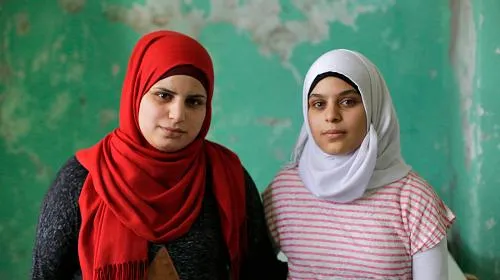AMMAN/DAHUK (October 24, 2019) – More than two weeks after the escalation of violence in north-east Syria, women, children, and families continue to be uprooted from their homes, with displacement figures reaching close to 180,000, according to the United Nations. While civilians continue to bear the brunt of the recent fighting, women and girls are the most affected, reporting psychological distress, lack of medical care and need for essential items, including warmer clothing as the winter approaches.
“Tens of thousands of civilians are in desperate need of humanitarian assistance. Many women in north-east Syria have been separated from their husbands, sons, or brothers and are escaping the fighting with nothing but the clothes on their backs and the children in their arms. They are especially vulnerable and in need of protection, psychosocial support and services that address their specific needs,” said Nirvana Shawky, CARE’s Regional Director for the Middle East and North Africa.
Displaced women do not have access to medical assistance, as functioning healthcare facilities are overwhelmed with emergency cases. Pregnant women are at risk and unable to reach doctors or hospitals for medical assistance. Ambulances can only provide services to births and other emergency cases. With people sheltering in the corridors and rooms of public buildings, women and girls are also in need of privacy for their personal hygiene, dignity, and wellbeing. Most of them have to walk outside shelters, alone in the night to reach a toilet, posing a risk to their safety.
“We are visiting collective shelters hosting displaced people, including schools, and seeing many women who are unable to cope with the situation. They are under a lot of psychological stress and we are seeing increased depression and anxiety cases among women and girls. This is especially affecting young and pregnant women, many of whom have become displaced for the first time. The women I see cry whenever we meet. They tell me all they want is to go back home,” said Lamia*, an aid worker for CARE in northern Syria.
Outside Syria, the situation is becoming increasingly dire in Iraq, as about a thousand refugees from Syria cross into the country on a daily basis. CARE is stepping up its humanitarian operations in the Kurdistan region of Iraq. A first priority will be the provision of safe drinking water, basic sanitary infrastructure, waste management, and hygiene support in a refugee camp near the border.
“Safe drinking water and securing toilets to ensure the dignity and safety for women and girls is an absolute must at the moment,” says Wendy Barron, CARE’s Iraq Country Director. “Another very important need we have seen in the past is to find ways to provide safety and adequate support for women and girls in this vulnerable situation.”
In the past months, CARE has consecutively warned of the consequences of decreased humanitarian funding for Iraq. This call is now being reemphasized by Barron, “The Kurdistan Region of Iraq already hosts nearly 230,000 refugees from Syria in addition to more than one million Iraqis who are displaced within their borders. Local host communities are stretched to their limits and the situation in many camps is very difficult. Aid agencies like CARE are concerned that funding will continue to decrease while needs are obviously on the rise.”
*Names have been changed to protect identities.
For interviews, please contact:
Fatima Azzeh, Senior Communications Manager for the Syria Crisis, Fatima.azzeh@care.org, +962 79 711 7414.
Sabine Wilke, Director Communications and Advocacy, CARE Germany, wilke@care.de, + 49 (0) 151 147 805 98
Ninja Taprogge, Media Officer, CARE Germany, taprogge@care.de, + 49 (0) 151 701 674 97

